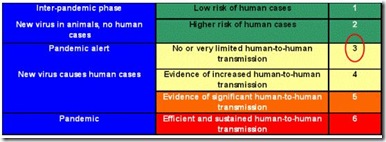# 2418
Today Robert Roos, News Editor for CIDRAP (Center for Infectious Disease Research & Policy) brings us a first look at the new proposed Pandemic Alert Phases contained in the revised pandemic influenza preparedness plan that is currently being reviewed.
The pandemic phase definitions in place over the past few years have been roundly criticized as being too vague, and open to differing interpretation.
Here are the current pandemic alert phases.
(click to enlarge)
There are many who would argue that - while we remain at Phase 3 - the criteria for Phase 4 has been reached.
As moving to Phase 4 has global implications, and would activate certain pandemic preparedness plans, the WHO has been reluctant to do so based on the limited number of human-to-human cases we've seen.
While some might view this as moving the goal line, in fairness, this is the first time the WHO, or anyone for that matter, has watched as a virus possibly moves towards pandemic status.
Early expectations as to the speed of progression from limited human-to-human transmission, to sustained transmission, were simply guesses. As we learn more, I find it reasonable to adjust our criteria.
I've only posted the opening paragraphs to Robert's report. Follow the link to read it in its entirety.
WHO's draft pandemic flu guidance revises phases
Robert Roos
News Editor
Oct 24, 2008 (CIDRAP News) – The World Health Organization (WHO) has drafted a revised pandemic influenza preparedness plan that updates the definitions of pandemic phases and puts more emphasis on the social and economic effects of a global epidemic, among other changes.
The plan, intended to replace the existing one published in 2005, aims to present "simpler and more precise definitions" of the six pandemic phases and groups them to emphasize planning and preparedness considerations. The draft also defines "post-peak" and "possible new wave" phases.
The WHO is seeking comments on the draft and plans to publish the final version in December. Interested people can request a copy through the WHO Web site; to file comments, they must fill out a "declaration of interest" form. Comments must be submitted by Nov 3.
The agency says it is revising its guidance to reflect scientific advances and increased practical experience in responding to human and avian influenza since 2005. Events have included the development of national antiviral stockpiles, the approval of some H5N1 vaccines, the launch of efforts to create an international H5N1 vaccine stockpile, advances in understanding of past pandemics, and more knowledge of possible control strategies, the WHO said in a July statement on the drafting process.
Also, practical experience in pandemic planning and in responding to avian flu outbreaks in the past 3 years has led to "a greater recognition that pandemic preparedness planning requires the involvement of both health and non-health sectors," the agency said.
WHO request for comments on draft guidance
WHO update on the revision drafting process
